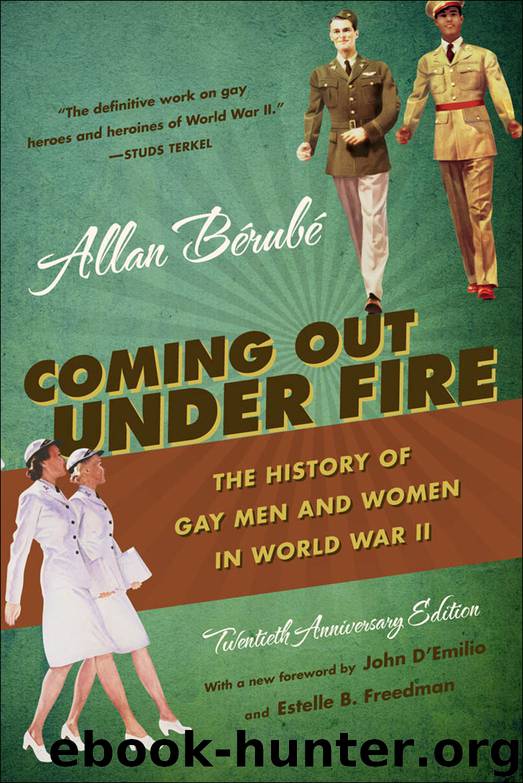Coming Out Under Fire by Allan Bérubé

Author:Allan Bérubé
Language: eng
Format: epub
Publisher: The University of North Carolina Press
Published: 2010-03-05T16:00:00+00:00
Relaxed enforcement of antigay policies in combat areas corresponded to relaxed prejudices among the men. It is likely that in nearly every combat unit—Army companies were generally made up of a few hundred men—there were several gay soldiers. Many enjoyed the “live and let live attitude”37 and even the respect from other men that could develop into a strong camaraderie as the men survived battle after battle together. Commanding officers knew that such camaraderie reinforced morale and discipline and was as essential to the men's fighting effectiveness as training, weapons, and ammunition.38 Under the extreme conditions at the fronts, the boundaries that ordinarily separated men based on race, rank, sexuality, age, and other differences weakened as men dealt with their dependence on each other, their sexual desires, their fears, and their grief. As a result gay soldiers, whether or not their fellow soldiers knew them to be gay, could feel less out of place and less “queer” in a world of imminent danger where they could protect, rely on, and be needed by their comrades-in-arms.
In battle GIs judged a man first for his loyalty, know-how, and teamwork more than for his personal life. “We have learned the hard way that no man is an island,” wrote World War II veteran activist Charles G. Bolte in 1945. “In this comradeship we learned to judge the men we loved as brothers by what they were and by what they did, not by the clothes they wore, the house they lived in, the accent they spoke with, or the place where they worshipped.”39 The outcast was the unreliable loner who didn't do his part. The combat soldier's pragmatic check on his prejudices could be reluctant and temporary, but that did not make the gay soldier's sense of belonging and being needed any less real.
Veterans of all kinds describe the love they felt for each other with a passion, romance, and sentimentality that often rivaled gay men's expressions of their love for other men and made gay affections seem less out of place. “You're dealing with excesses of love and hate,” explained Marine Corps veteran William Manchester, who was not gay, “and among men who fight together there is an intense love. You are closer to those men than to anyone except your immediate family when you were young.”40 “War binds men more tightly together than almost any other branch of human activity,” observed Jack Belden, another veteran who wrote about seeing action in World War II. “To share your last crumb of bread with another, to warm your enfeebled body against another's in the bleak and barren mystery of the night, to undergo shame, fear and death with scores of others of your age and mental colouring—who, indeed, would trade these comrades of the battlefield for friends made in time of peace.”41
In combat, gay soldiers won a hard-earned acceptance from their buddies as men and as soldiers that sometimes repaired the damage to their self-respect caused by stereotypes that portrayed them as silly, unreliable, and “not one of us.
Download
This site does not store any files on its server. We only index and link to content provided by other sites. Please contact the content providers to delete copyright contents if any and email us, we'll remove relevant links or contents immediately.
| African-American Studies | Asian American Studies |
| Disabled | Ethnic Studies |
| Hispanic American Studies | LGBT |
| Minority Studies | Native American Studies |
Cecilia; Or, Memoirs of an Heiress — Volume 1 by Fanny Burney(32558)
The Great Music City by Andrea Baker(32019)
Cecilia; Or, Memoirs of an Heiress — Volume 2 by Fanny Burney(31956)
Cecilia; Or, Memoirs of an Heiress — Volume 3 by Fanny Burney(31942)
We're Going to Need More Wine by Gabrielle Union(19046)
All the Missing Girls by Megan Miranda(16029)
Pimp by Iceberg Slim(14508)
For the Love of Europe by Rick Steves(14121)
Bombshells: Glamour Girls of a Lifetime by Sullivan Steve(14076)
Talking to Strangers by Malcolm Gladwell(13370)
Norse Mythology by Gaiman Neil(13365)
Fifty Shades Freed by E L James(13241)
Mindhunter: Inside the FBI's Elite Serial Crime Unit by John E. Douglas & Mark Olshaker(9343)
Crazy Rich Asians by Kevin Kwan(9292)
The Lost Art of Listening by Michael P. Nichols(7506)
Enlightenment Now: The Case for Reason, Science, Humanism, and Progress by Steven Pinker(7313)
The Four Agreements by Don Miguel Ruiz(6765)
Bad Blood by John Carreyrou(6621)
Weapons of Math Destruction by Cathy O'Neil(6280)
